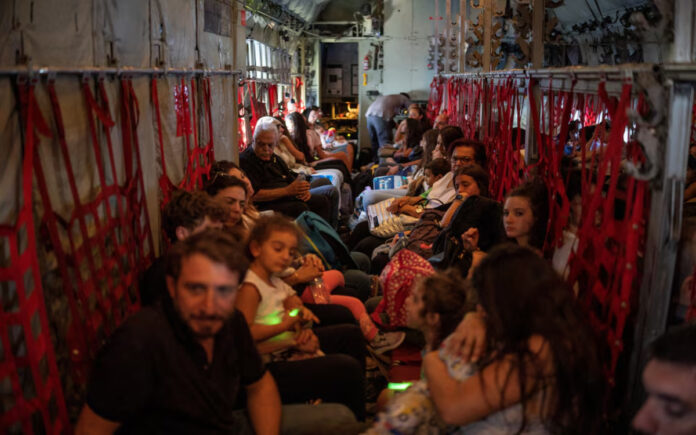Beirut: Foreign nationals from Europe, Asia, and the Middle East fled Lebanon on Thursday as Israel’s intensified bombing of Beirut spurred urgent evacuations, with governments worldwide advising their citizens to leave.
Countries organized air evacuations, while many others fled aboard crowded ferries or smaller vessels as bombs rained down on the capital. Israel, meanwhile, urged residents to evacuate more than 20 towns in southern Lebanon as the conflict escalated, drawing in Iran and heightening concerns of U.S. involvement.
In Beirut, dozens of Greeks and Greek Cypriots boarded a Greek military aircraft, with many children clutching toys and school bags. Some played with glow sticks, while others slept on their parents’ laps in the cramped cabin as the plane lifted off from the smoking city. After dropping off 38 Cypriots at Larnaca Airport in Cyprus, the aircraft continued to Athens, where 22 Greek nationals disembarked.
Many evacuees described the chaos and fear that have taken hold as the bombing campaign escalates.
“We were trapped; there was no other way to leave because Middle East flights were fully booked, and the earliest available flight was in 10 days,” said Giorgos Seib, who landed in Larnaca. “Every day the situation gets worse, and we don’t know what will happen tomorrow.”
Lebanon’s Health Minister Firass Abiad reported on Thursday that nearly 2,000 people have died since Israeli attacks began over the past year, including 127 children.
Expatriates have been scrambling to escape, with governments from China to Europe drawing up evacuation plans. Russia organized a special flight on Thursday for family members of its diplomats, while Australia secured hundreds of airline seats for its citizens.
A Spanish military aircraft carrying 204 evacuees landed at Torrejon Air Base near Madrid, with another plane carrying 40 more evacuees expected later. Spain’s Defense Minister, Margarita Robles, said Spain may continue evacuating citizens from other countries as well.
Also Read | India’s Top Court Pressures Authorities to Address Air Quality Crisis Amidst Stubble Burning
Trauma and Desperation
At Turkey’s Tasucu port in Mersin, Gretchen, an American who lived in Beirut for five years, described her harrowing journey on a commercial ferry after Beirut flights were canceled.
“We constantly heard artillery and shelling—it was too much,” she said after arriving. “I just wanted to leave immediately.”
Several Lebanese nationals also disembarked in Tasucu, with many transiting through Turkey en route to other countries. Some held dual citizenship and were seeking safety abroad.
Sami Al King, a Lebanese man living in Ghana, shared his complex route to safety as he left on the ferry after all flights out of Lebanon were booked. “All our families are scattered throughout Lebanon. So yes, you are worried, leaving your loved ones behind,” King said.
While some evacuees hope to return to Lebanon, many remain traumatized by the violence.
Gigi Khalifa, a Libyan Cypriot who moved to Lebanon four years ago so her children could learn Arabic, described her experience after landing in Larnaca.
“The bombing was so close—it was very traumatic,” she said, her voice breaking. “I feel bad for everyone left behind, my friends, my children’s friends. I don’t know if we will ever see them again.”



